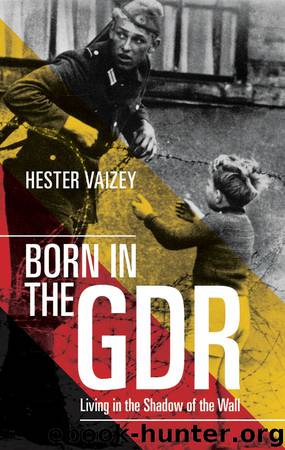Born in the GDR by Vaizey Hester

Author:Vaizey, Hester [Vaizey, Hester]
Language: eng
Format: epub
ISBN: 9780198718734
Publisher: OUP Oxford
Published: 2014-10-09T06:00:00+00:00
6
Robert ~ Supporting the Idea of Socialism
The way people recall life in the GDR is just so different that it is surprising to find that they lived in the same country.1 The constant hounding by the Stasi drove Mario to an escape attempt, landing him in prison and leaving him with a lifetime of psychological scars. It is understandable, then, that the Stasi features prominently in his memories of the GDR. In Katharina’s case, her experience of discrimination by the state on account of her faith helps to explain why stories of Stasi intimidation also form a significant part of her testimony about life in the GDR.2 For some East Germans, however, who had little or no contact with East Germany’s state security apparatus, the Stasi forms little part in their recollections of living under socialism. Robert, who spent the first fifteen years of his life growing up in communist East Germany, is one of these. Looking back now, he feels that the GDR has been totally demonized by histories that are overly focused on Stasi activities. It creates a false impression, he explains, of what life was like.
Sensationalist media interest in the Stasi has portrayed the GDR as a highly regulated surveillance society in which freedom of speech and freedom of travel were severely curtailed. Not so, says Robert. As the son of a Free German Youth (FDJ) functionary Robert grew up in Berlin-Marzahn in a family that believed in the proclaimed goals of a socialist state: eliminating inequalities and working together collectively for the overall good of the GDR. Robert’s father was one of the leading figures in the Org-Büro, the events management department of the FDJ, and, though he sometimes criticized the reality of East German politics, on the whole he believed in the principles of communism. Growing up in a family which supported the state and not holding views that clashed with the Party’s ideology, Robert did not feel many constraints on his freedom of speech. ‘After all,’ he explains, ‘I was a child, and most of my friends in Berlin-Marzahn came from families which supported the system.’
Nor were travel restrictions a significant problem for Robert’s family. Within the bounds of what was possible for GDR citizens, Robert and his family went on many trips abroad, visiting Hungary, Poland, Bulgaria, and Czechoslovakia. All of this meant that Robert and his family were not knocking up against the state’s boundaries of acceptability. They felt to some degree free.
In fact, in contrast to the portrayals of the GDR as strictly regimented, Robert insists that there was actually plenty of scope to do your own thing and that it would be wrong to overemphasize the influence of the Stasi in day-to-day life. East Germans adapted their behaviour to conform where necessary, for example not shouting out criticism of the system on the street. And this was obviously more easily done if you supported the regime. But within the bounds of cautionary, sensible behaviour, Robert recalls, there were ways of sidestepping state control.
Download
This site does not store any files on its server. We only index and link to content provided by other sites. Please contact the content providers to delete copyright contents if any and email us, we'll remove relevant links or contents immediately.
| Belgium | France |
| Germany | Great Britain |
| Greenland | Italy |
| Netherlands | Romania |
| Scandinavia |
Room 212 by Kate Stewart(4127)
The Crown by Robert Lacey(4122)
Endurance: Shackleton's Incredible Voyage by Alfred Lansing(3863)
The Iron Duke by The Iron Duke(3660)
The Rape of Nanking by Iris Chang(3537)
Killing England by Bill O'Reilly(3470)
Joan of Arc by Mary Gordon(3276)
Say Nothing by Patrick Radden Keefe(3082)
I'll Give You the Sun by Jandy Nelson(2852)
Shadow of Night by Deborah Harkness(2753)
Hitler's Monsters by Eric Kurlander(2742)
Margaret Thatcher: The Autobiography by Thatcher Margaret(2693)
Mary, Queen of Scots, and the Murder of Lord Darnley by Alison Weir(2684)
Darkest Hour by Anthony McCarten(2657)
Blood and Sand by Alex Von Tunzelmann(2617)
Red Famine: Stalin's War on Ukraine by Anne Applebaum(2474)
Eleanor & Park by Rainbow Rowell(2404)
The One Memory of Flora Banks by Emily Barr(2359)
Book of Life by Deborah Harkness(2290)
